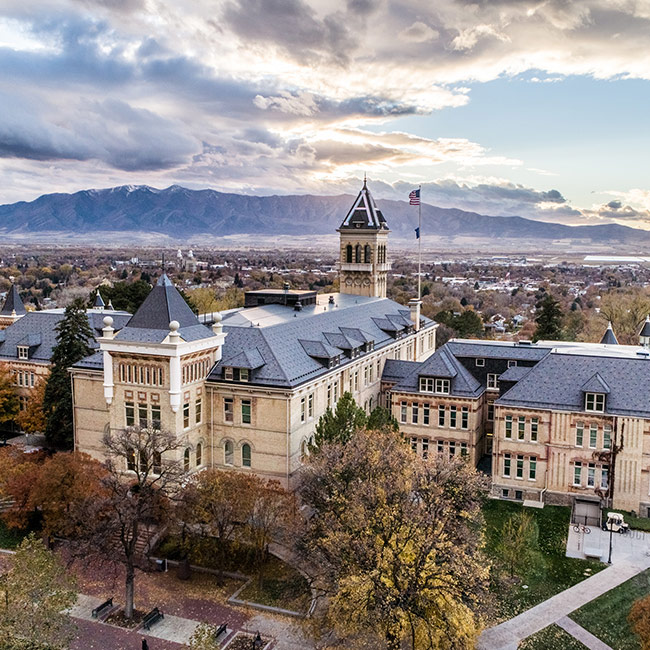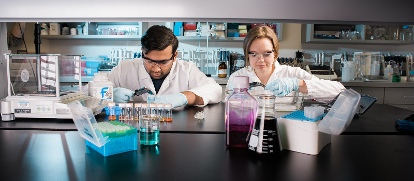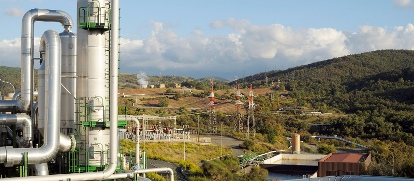About This Degree
While students have the opportunity to do research in the traditional areas of biochemistry, analytical, inorganic, organic, and physical chemistries, they also have access to pursue interdisciplinary research that spans several of these sub-disciplines or goes beyond them.
These interdisciplinary research topics encompass areas in medical, computer, and environmental science and allow students to interact with groups from diverse scientific areas in collaborations designed to solve complex, multi-faceted problems.
Research programs are consistently funded by national agencies such as the National Science Foundation, National Institutes of Health, and the U.S. Department of Energy.
Specialization:
Students may choose an emphasis in one of the following areas.
Analytical Chemistry:
This specialization researches novel optical methods of chemical analysis; white light spectrometry; and the analysis of large, nonvolatile molecules by mass spectrometry. Environmental chemistry is a major focus, with research projects directed toward the development and application of methods for the analysis of small particles in the atmosphere and the application of real-time mass spectrometry for aerosol analysis, and the detection of trace fluorocarbon substances in the atmosphere.
Inorganic Chemistry:
In this specialization, research is devoted to understanding how metal-catalyzed chemical processes occur, and how features associated with the metal center influence chemistry. In bioinorganic chemistry, approaches involve the synthesis of model complexes that are designed to mimic structural, spectroscopic, and reactivity features of metalloenzyme active sites. Comprehensive studies of these model complexes increase understanding of the chemical principles that control the structure and function of metalloenzymes.
Organic Chemistry:
This specialization focuses in the areas of physical organic chemistry and the synthesis of biologically active compounds. Mechanistic studies using novel kinetic techniques are questioning long-held assumptions about the details of some common chemical reactions. Other projects investigate the details of reactions at the chemistry-biology interface, including the chemistry of phosphate and sulfate esters. Other groups are working on the synthesis of novel unusual sugar-containing antibiotics or anticancer agents, and on studying the structural chemistry of naturally occurring compounds, in order to understand how structure affects stability, reactivity, and biological activity.
Physical Chemistry:
This specialization focuses on computational chemistry. Research at USU led to the first experimental and theoretical evidence of aromaticity in all-metal systems. Other projects utilize modern methods of electronic structure theory to understand the fundamental nature of interactions between molecules, chiefly hydrogen bonds, which are critical to structure and function of biomolecules like proteins. In addition, projects in theoretical chemical physics are directed to studying the dynamics of microscopic and mesoscopic systems (e.g., quantum dots) in the classical limit of quantum mechanics.
ADVISING
At a Glance
College: College of Science
Department: Chemistry and Biochemistry Department
USU Locations:
- Logan campus
Program Requirements
Career And Outcomes
Career Opportunities
Chemistry is a versatile degree. While many of USU’s graduate alumni enter the fields of research and academia, the following options are also available to chemistry graduates:
- Chemistry
- Ethnobotany
- Environmental law
- Patent law
- Pharmaceuticals
- Oceanography
- Forensic science
- Biotechnology
- Metallurgy
- Ceramics industry
- Plastics industry
- Paper industry
- Medicine
- Teaching
- Engineering
- Geochemistry
- Agrochemistry
- Military systems
Job Outlook
USU Locations

LOGAN CAMPUS
Admission
Admission Requirements
Prospective students in the graduate programs must have undergraduate degrees in chemistry or biochemistry.
Application Requirements:
- Complete the online application
- Pay the $55 application fee
- Score at or above the 40th percentile on in the GRE
- Have a 3.0 or higher GPA on your last 60 semester or 90 quarter credits
- Provide transcripts of all college/university credits
- Provide three contacts for letters of recommendation
International students have additional admissions requirements.
Deadlines
Due to the nature of graduate course sequences, it is highly recommended that students enter the graduate program in the fall semester. Although there are no application deadlines, submission of all application materials by March 15 is strongly encouraged.
Program Requirements
In the weeks prior to the first academic semester, new students must participate in the graduate student orientation program. New students are required to attend a safety workshop and departmental orientation sessions, take departmental competency examinations, and receive academic advising. Students receiving a teaching assistantship must attend training sessions administered by the School of Graduate Studies. The scheduling of these events will be announced well in advance.
PhD Qualifying Exams:
PhD students must take both written and oral candidacy examinations. The written examination ensures that students have a broad understanding of chemistry and the depth of knowledge in their chosen fields required for PhD work. The written examination must be passed before the oral examination is attempted.
Plan Options
Students can receive the MS by pursuing the following option:
- In the Plan A option, students complete graduate-level coursework and must write a thesis.
Financial Aid
First-year graduate students are awarded a $1,000 Department of Chemistry and Biochemistry Fellowship. Health insurance is offered to graduate students at a subsidized rate (80% covered).
The Willard L. Eccles Foundation Science Fellowship is an award of $22,000 per year for three years. The graduate programs committee nominates two to three candidates, and one candidate is chosen from the College of Science each year. Selection criteria include: grade point average, GRE score, letters of recommendation, and evidence of strong academic and research potential in the discipline.
Assistantships are also available. With these, the department is responsible for the first nine months of stipend and tuition, with the remaining summer stipend and tuition usually paid from faculty research funds. Teaching assistants devote no more than 12 hours per week directing undergraduate laboratories, leading recitation sections, and assisting students with questions during the regular two-semester academic year. Research assistantships are funded from individual faculty research grants and support students conducting research related to the grant projects. Although first-year students are not normally supported as research assistants, well-prepared students may be eligible for research support at the discretion of their major professor.
A variety of funding opportunities are available on the graduate school website.
Take The Next Step
How to Apply
View our step-by-step guide on how to become an Aggie.
Request Information
Contact the School of Graduate Studies to ask questions or receive more information.
Cost and Funding
Calculate the cost of graduate school and learn about funding opportunities.
You May Also Be Interested In

Biochemistry
Study in a program that receives consistent funding from national agencies. Conduct your research in areas such as global energy, bioremediation, and human health and disease.

Biological Engineering
Apply engineering principles to cells, microbes, and DNA to solve society’s issues. Be part of a premier program with nationally recognized faculty and top research facilities.

Civil and Environmental Engineering
Earn a degree in civil and environmental engineering from an accredited program where engineers solve world problems and protect public health and the environment.

